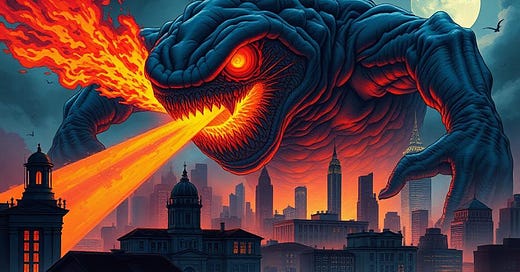Several weeks ago, I interviewed Fr. Ryan Duns, SJ, for an episode of “AMDG: A Jesuit Podcast” which released this week. Ryan is a theology professor at Marquette University and author of the book, Theology of Horror: The Hidden Depths of Popular Films.
I’m no huge fan of horror films, but I do love speculative storytelling. And I particularly love when we use speculative stories to better understand and wrestle with the presence of God in our lives. (Remember that book on Star Wars and Ignatian spiritualty I keep bringing up? Annoying, I know.)
Ryan and I talked a lot about monsters and what they represent for the story being told. The arrival of a monster on the scene—whether it’s a goopy creature with bug eyes or a chainsaw wielding serial killer—calls into question everything our characters think they know about the world and their place in it.
Suddenly, reality feels much bigger and uncomfortably unknowable. And that’s scary. New questions arise within our characters: If this thing can exist, then what else don’t I know? If this thing can cause me such harm, does anything really matter? If my life can be so thoroughly thrown upside down, then why bother going on?
These questions are often unpleasant ones. They scramble our sense of self and community. They leave us with two options: Confront the bigger, scarier, more mysterious world that this “monster” portends; or, kill the monster and pretend none of this ever happened.
In a traditional hero’s journey, the status quo is introduced at the story’s beginning, often so as to show some degree of complacency, insufficiency or oppression at work in our main characters. Luke isn’t meant to be a moisture farmer; he’s meant to be a Jedi. Rapunzel isn’t meant to stay locked away in her tower; she’s meant to reclaim her rightful place as princess. Harry Potter isn’t meant to live life under a stairwell; he’s meant to be a wizard. Elphaba isn’t meant to be a second-class citizen suppressing her magic; she’s meant to meet the wizard. And so on.
The status quo is necessarily lacking; our hero needs to step beyond the status quo so as to transform it. (I wrote a whole series on Ignatian spirituality and the hero’s journey, if you’re interested in reading more of my thoughts on this.)
But in a monster story, the status quo is held up as semi-sacred. The monster disrupts the status quo, and it’s all our heroes can do to protect it and return to a sense of “normal.” We don’t want aliens patrolling our streets or creepy dolls taking over our homes or demons possessing our bodies. We want everything to go back to the way it was.
Now, here’s the twist: As Ryan and I continued to talk, as we layered these themes from horror films and monster movies into our theological narratives and scriptural stories, one thing became uncomfortably clear.
Jesus is the monster.
Jesus arrives on the scene quite suddenly to disrupt the status quo. Jesus’ mission is to overturn our understanding of how society works. Jesus frightens those who are bound to their money, to their rules, to their hate and biases, to their divisiveness and pride and privilege. And Jesus’ very presence demands a rethinking of the whole of reality: Is God really this big, this inclusive, this loving, this compassionate? And are we really made in the image and likeness of that same God? What, then, must we do differently?
It's easier to kill the monster. And so they do. We commemorate those stories in this coming week called Holy. This is a challenging realization, I think, a flipping of the scripts. Because Jesus, of course, comes with open arms and a call to love our neighbor; he’s no googly-eyed space lizard bent on eating human flesh. But he disrupts our status quo all the same; he startles our sense of self, our own complacency and comfort.
What of our own personal status quo is Jesus challenging this week? And how are we tempted to resist that challenge in our own misguided efforts to kill the monster?
And another thing:
Definitely give that podcast episode a listen! Click here to find it.
Speaking of podcasts, I was a guest on Rob Commodari’s “Chiseled.” Check it out.
I wrote about finding comfort in old things over at IgnatianSpirituality.com. Give it a read.
And finally, you can enter to win a copy of my upcoming Finding Peace Here and Now: How Ignatian Spirituality Leads Us to Healing and Wholeness. Click here to enter the contest!






Such a cool take. I've been riveted by a similar novel idea where the characters 'release' a god from a sanctum, convinced that it's evil, and find out that they've understood the whole world wrong, and it's actually good.... Which is frankly how we relate to Jesus anyway.
“Jesus is the monster.” That hits for me and gives me real pause (in a good sense). Thanks Eric!